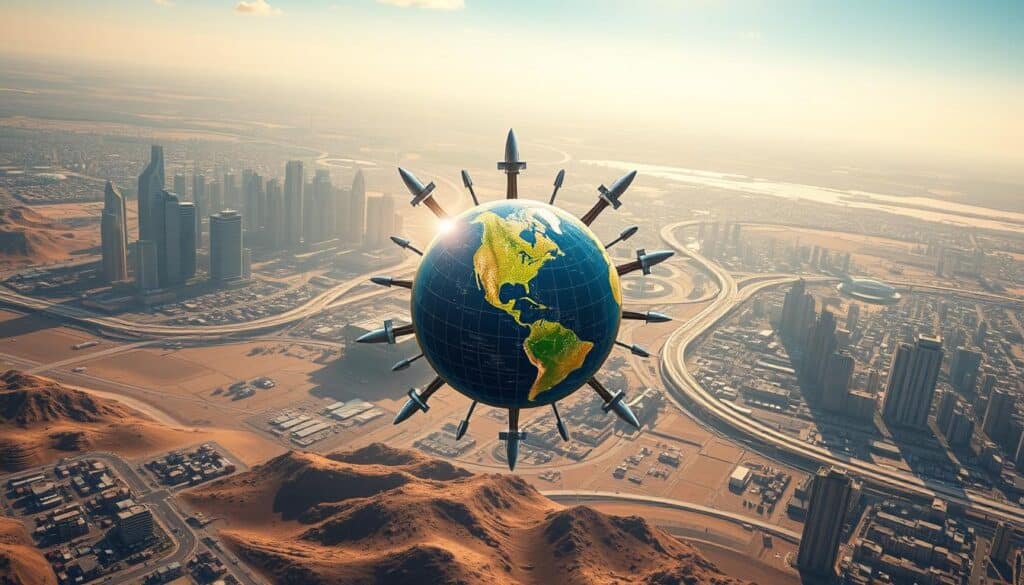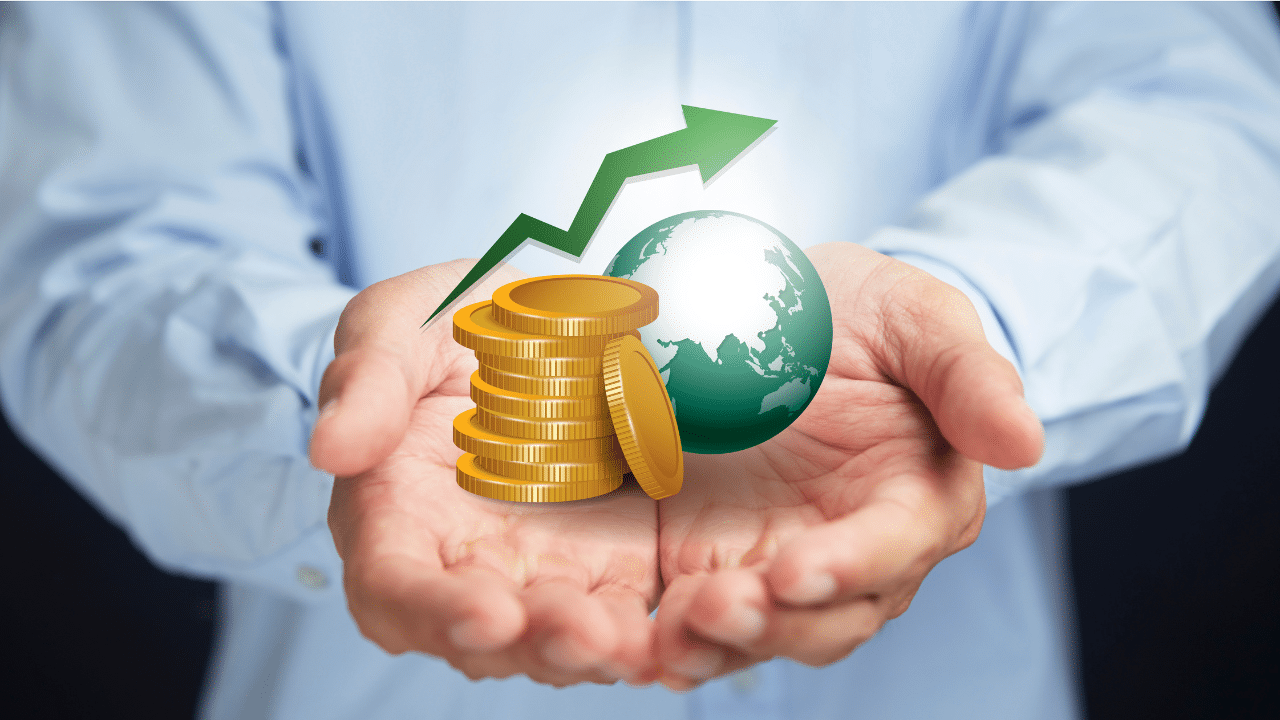Economic globalization marks a big change in global commerce. It’s about economies around the world becoming interconnected. This trend helps with trade and investment between countries but also changes national and global economies significantly. Thanks to technology and better communication, how countries interact keeps evolving. This article will explore what drives economic globalization, its good and bad sides, and new trends in the global market.

Chase Sapphire Preferred®
Understanding Economic Globalization
Economic globalization means businesses and governments mix on a global level. It links economies together, making one big world economy. As trade barriers fall, products and services move freely, increasing competition and new ideas.
Anúncios
This mingling of economies changes labor markets and how people buy things. It helps countries grow, especially newer markets, by giving them access to international funds and technology. Countries trading globally often see better living standards due to more jobs and investments.
But, economic globalization also has its downsides. While some countries thrive, others may depend too much on outside help, making them vulnerable. Balancing global involvement with protecting local businesses shows how complex this issue is.

A Historical Perspective on Globalization
The story of globalization is full of twists and turns. It’s been influenced by major trade paths that helped share goods, ideas, and cultures. Since ancient days, these paths were key in creating a world where societies are linked. They sparked a cultural blend, setting the stage for the global connections we see today.
Early Trade Routes and Cultural Exchange
The Silk Road is a prime example of early globalization. It stretched over 4,000 miles, linking Europe, Asia, and Africa. Along this route, traders exchanged silk, spices, and much more. They also swapped ideas, technological advances, and cultural habits.
- Cultural practices like art, music, and literature were disseminated along these routes.
- Technological innovations such as papermaking and the compass were shared across continents.
- Religious beliefs and practices spread, influencing diverse civilizations.
The Columbian Exchange and its Global Influence
The Columbian Exchange was a key moment in globalization’s story. It brought an unmatched exchange of crops, animals, and cultures between the Americas and Europe. After Europeans explored new lands, the introduction of crops like potatoes and maize changed diets worldwide.
This time also showed globalization’s negative side. The Triangular Trade forced many into slavery, highlighting the suffering linked to global trade. These events have lasting effects, shaping how populations and cultures interact across the globe.
Drivers of Economic Globalization
Economic globalization has grown quickly because of important factors. These include tech improvements and new trade deals. How we talk and move goods globally has changed, reinventing international business operations.
Technological Advancements: Communication and Transportation
The impact of tech on globalization is huge. The internet and better shipping methods have made things faster and cheaper. Now, businesses can reach out globally, breaking down distance barriers. This makes doing deals across the world instant, smoothing the path for global trade.
The Role of International Trade Agreements
Trade deals are vital for global economic growth. Agreements, such as NAFTA and WTO rules, lower tariffs and push for fair trading. They help countries trade across borders easily, helping businesses grow abroad.
Benefits of Economic Globalization
Economic globalization opens up many opportunities for a country’s economy. It allows more trade and investment across borders. This helps businesses reach global markets and embrace new ideas. Such connections lead to growth and cooperation between countries.
Increased Trade and Investment Opportunities
Globalization leads to more trade and investment chances. Companies can sell to customers worldwide, greatly expanding their markets. This brings several benefits:
- Lower production costs by using cheaper materials and labor from other countries.
- A bigger pool of consumers, which boosts sales and profits.
- More foreign investment that creates jobs and helps local economies grow.
All these factors drive economic progress and support global cooperation and development.
Enhanced Competitive Advantages for Businesses
Globalization boosts companies’ competitive edge. It lets businesses innovate and respond to market changes quickly on a global scale. They can:
- Get materials from different places, saving costs.
- Use talents from around the world to spark innovation and creativity.
- Build a supply chain that meets market demands efficiently.
Industries like automotive manufacturing show how beneficial this can be. They keep costs low and react quickly to changes worldwide by using global supply chains.
Challenges Posed by Economic Globalization
Economic globalization brings big changes to society. It makes industries move to places where it’s cheaper to work. This causes job losses in developed countries. It affects both workers and the economy. Also, the gap between rich and poor gets bigger because of these changes.
Job Losses in Developed Countries
Companies move jobs to countries with lower wages to save money. This leaves many workers without jobs, especially in older industries. Families and whole communities feel this impact. It puts a strain on supports meant to help people in tough times.
Widening Income Inequality
Globalization also makes income inequality worse. People with less education often earn less, while those with higher education may earn more. This makes the income gap bigger. It can lead to tension and hurt how people get along in society.
The Impact of Globalization on Developing Countries
Globalization has fundamentally changed developing countries, like China and Vietnam. These countries have seen huge economic growth. They’ve managed to greatly reduce poverty. This is thanks to more foreign investment and bigger export markets.
Case Studies: Growth in China and Vietnam
China and Vietnam show how globalization helps nations grow. China has become a leading economy through its manufacturing industry. Vietnam, on the other hand, has attracted big companies with its workforce and trade policies. This has boosted Vietnam’s economy and created more jobs.
Concerns Over Labor Standards
But, this growth has its downsides. Both countries face criticism about how they treat workers. Industries like textiles often have poor working conditions and exploit workers. Keeping production costs low can lead to ignoring worker rights. This makes us question the real cost of growth in these countries.
Fixing labor standards in China and Vietnam is essential. They need to balance growth with fair and ethical treatment of workers. Ensuring sustainable and fair development is key to their future.
Multinational Corporations in a Globalized Economy
Multinational corporations (MNCs) are key in our global economy. They help move goods, services, and money across borders. This helps the world’s economy connect better. They use global production models, making products efficiently by using resources from different places.
The Role of MNCs in Economic Integration
MNCs link up markets worldwide by working in many countries. This speeds up economic integration and encourages nations to work together. They play vital roles such as:
- Creating jobs in host countries
- Enhancing technology transfer
- Boosting local economies through investment
- Standardizing products and services across regions
Cross-Border Production Models
Cross-border production changes how MNCs work. They break down the production process across different countries. This lets them use the best skills and save costs. Such strategies let them:
- Minimize production costs
- Respond quickly to what customers want
- Improve product quality with specialized labor
- Reach more markets effectively
Environmental Implications of Economic Globalization
Economic globalization is growing fast and raising big environmental concerns. These concerns are mostly about pollution and climate change. As global trade gets bigger, more goods move across borders. This results in more emissions and more use of resources. The effects of globalization on the environment come in many forms. It’s important we tackle these challenges soon.
Pollution and Climate Change Concerns
Globalization helps with industrial growth and economic development. But, it also leads to worse environmental conditions. The main reason is the mass production of goods without caring for the environment. This causes a sharp increase in greenhouse gas emissions. It makes climate change problems even worse.
There are key factors behind these environmental issues:
- More emissions from shipping goods all around the world.
- Production practices that use lots of resources, especially in developing countries.
- Weak rules that let companies harm the environment without consequences.
To deal with globalization’s impact on the environment, countries must work together. Global rules to protect the environment could help a lot. They could reduce pollution and fight climate change. Only by working together can we control the negative effects of globalization.
The Future of Economic Globalization
The world of economic globalization is changing fast. New technologies and how people buy things are leading the change. These shifts are also affecting politics and how countries interact with each other. As countries like India and Brazil grow economically, they change how the world’s economy works. This brings new patterns in global trade and moves economic power in ways we’ve never seen before.
Trends Influencing Global Economic Structures
- The rise of digital economies and e-commerce is transforming business operations and consumer interactions.
- Increased focus on sustainability and ethical practices drives corporate responsibility and consumer choices.
- Geopolitical tensions and trade agreements reshape collaboration and competition among nations.
Shifts in Global Economic Power
Now, several countries are growing fast economically. They are becoming important players worldwide. Countries like India, Brazil, and parts of Southeast Asia are making big leaps forward. This change is huge for the world’s economy. It’s changing trade policies and how countries work together.
Strategies for Adapting to Economic Globalization
To succeed in a connected world, countries need to adjust to globalization. It’s important to focus on developing the workforce. This is because the job market is always changing.
Investing in Education and Workforce Development
Improving the workforce is more than just school learning. It includes job training, ongoing education, and working with businesses. With these efforts, the workforce becomes ready for globalization’s challenges. This leads to more innovation and higher productivity.
Diversifying Economies and Building Resilience
Making an economy diverse is key to handling global market changes. By not relying on just one industry, a country stays stable. It also helps the economy grow in a healthy way. This method helps create new business areas. So, countries can keep up with global changes.
Global Economic Governance and Regulation
Global economic governance is very important for managing world trade and finance. With economies closely tied together, groups like the WTO are key in setting rules for fair trading. Good economic governance is crucial for preventing conflicts and making sure countries follow the rules.
Role of International Organizations like the WTO
The WTO is important in shaping global trade. It helps countries deal with globalization by offering a place to solve disputes and talk things through. This helps keep the world market stable, encouraging growth and development.
Need for Global Economic Coordination
In recent years, it’s become clear we need to work together globally on economic matters. Issues like trade fights and financial crises need joint efforts to keep things stable. By working together through the WTO, countries can tackle these challenges and grow together.
The Societal Impact of Economic Globalization
Globalization changes society in many ways, like through cultural sharing and creating shared global views. This helps people from different places understand and tolerate each other more. But, it might also make unique cultures less noticeable under big global influences.
Cultural Exchange and Homogenization
When cultures exchange, they share and adopt new ideas and traditions. This makes society more diverse. Yet, it could also make local customs less common.
- Enhanced understanding of global traditions.
- Broadening artistic and culinary landscapes.
- Potential loss of distinct cultural identities.
Shared Global Perspectives and Challenges
Big worldwide issues show we are all connected because of economic globalization. Problems like climate change, uneven wealth, and health crises need us to work together. Here are the main things about these shared problems:
- Collective approaches to address climate change.
- Striving for economic equality across nations.
- Coordinated responses to pandemics and health crises.
Conclusion
Globalization brings both chances and challenges. As each country connects more to global markets, trade, investment, and culture exchanges grow. But, it’s crucial to find ways to use globalization’s benefits and fix its problems, like uneven wealth and work issues.
To make globalization work better, countries must work together. Governments, businesses, and communities should join forces. Together, they can create fair and lasting growth plans. As globalization changes, staying flexible is key to making it work for everyone.
Understanding globalization fully helps us move toward a united world. By working as a team and sharing duties, we can overcome future obstacles. At the same time, we can use globalization to make everyone’s future brighter.
FAQ
What is economic globalization?
How has technology impacted globalization?
What are the major benefits of economic globalization?
What challenges does globalization pose to developed nations?
How has globalization affected developing countries?
What is the role of multinational corporations (MNCs) in globalization?
What environmental concerns are associated with globalization?
What trends are shaping the future of economic globalization?
How can countries adapt to the challenges of globalization?
What role do international organizations like the WTO play in globalization?
What are the societal impacts of globalization?
Conteúdo criado com auxílio de Inteligência Artificial



